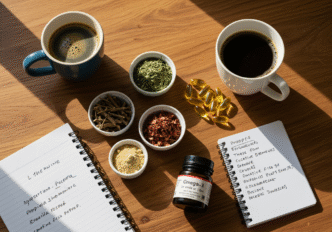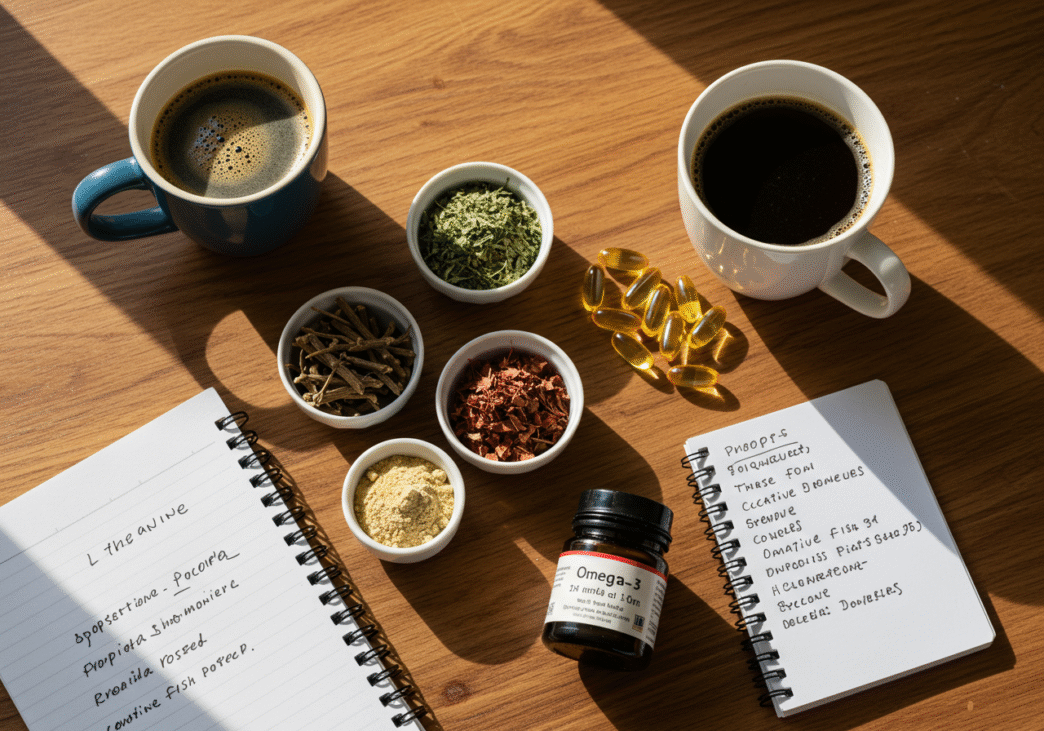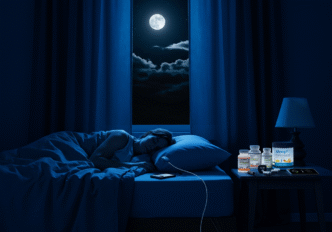

I remember sitting at my desk one Tuesday afternoon, staring blankly at my computer screen. The third cup of coffee hadn’t kicked in, and the deadline was creeping closer with each passing minute. That familiar brain fog had settled in – you probably know the one I’m talking about. That moment when your thoughts feel like they’re wading through molasses.
Wait, What Exactly Are Nootropics Anyway?
Nootropics are natural supplements or drugs that have a beneficial effect on brain function in healthy people. Many can boost memory, motivation, creativity, alertness, and general cognitive function. Some may even help reduce age-related declines in brain function .
But here’s what most articles won’t tell you: the term “nootropic” has been stretched way beyond its original meaning. When Romanian psychologist Corneliu Giurgea first coined the term in the 1970s, he had strict criteria – these substances needed to enhance learning and memory, protect the brain, and have extremely low toxicity.
Today? Anything that might give your brain a little nudge gets slapped with the nootropic label. That’s why I want to cut through the noise and focus on what actually works (and what’s actually safe).
How These Brain-Boosters Actually Work
I used to think nootropics were like magic pills that instantly transformed you into a genius. Not quite. The reality is much more interesting.
Nootropics typically work through several mechanisms. Some increase blood flow to your brain, ensuring your neurons get proper nutrition and oxygen. Others modulate important neurotransmitters like acetylcholine (crucial for learning and memory) or dopamine (involved in motivation and focus). Some even provide essential building blocks for brain cell membranes or protect against oxidative stress .
My neuroscience professor once explained it with a simple analogy: “Think of your brain as a high-performance car. Nootropics aren’t installing a new engine – they’re making sure the existing engine has premium fuel, clean filters, and optimized timing.”
The Top 5 Nootropics I’d Recommend for Beginners
After years of personal experimentation and digging through research papers (often while testing the very substances I was reading about), I’ve compiled my top recommendations for nootropic newcomers. These aren’t the most exotic options, but they have the best balance of effectiveness, safety, and scientific backing.
L-Theanine & Caffeine: The Perfect Starting Point
This is my everyday go-to, and frankly, it’s probably the smartest place to start your nootropic journey.
Caffeine is the world’s most widely consumed psychoactive stimulant, found naturally in coffee, tea, and cacao . You’re likely familiar with its ability to increase alertness and attention. What you might not know is that caffeine works by blocking adenosine receptors in your brain – the ones that make you feel sleepy .
But here’s where it gets interesting. L-theanine, an amino acid abundant in green tea, produces a state of calm alertness without drowsiness. Taking 200mg has been shown to increase alpha waves in the brain (those associated with creativity) .
The magic happens when you combine them. The caffeine provides the energy and focus, while L-theanine smooths out the jitters and anxiety that caffeine can cause. It’s like getting all the benefits of coffee without the drawbacks.
I usually take 100mg of L-theanine with my morning coffee (roughly 80-100mg of caffeine). On days requiring extra focus, I might have another dose in the early afternoon.
Rhodiola Rosea: Your Ally Against Mental Fatigue
This is what I call my “deadline day” supplement. Rhodiola is an adaptogenic herb that helps your body handle stress more effectively.
When I first tried it during a particularly brutal project week, I was surprised by how it reduced that mental exhaustion that typically sets in around 3 PM. Studies back this up – Rhodiola has been shown to decrease feelings of burnout in stressed individuals and reduce mental fatigue in college students during exam periods .
What makes Rhodiola particularly interesting is that it seems to work fairly quickly, unlike some other herbal nootropics that take weeks to build up in your system. I typically take 300-500mg on particularly demanding days, but not daily, as I find cycling it works best for me.
Creatine: Not Just for Gym Rats
“Isn’t that just for bodybuilders?” That was my first thought about creatine too. But I couldn’t have been more wrong.
Creatine is an amino acid that your body uses to produce protein, and yes, it’s popular for muscle growth. But it also plays a crucial role in brain energy metabolism. After consumption, creatine enters your brain and binds with phosphate, creating a molecule that your brain cells use for quick energy .
This increased energy availability is linked to improved short-term memory and reasoning skills, especially in vegetarians (who get less creatine naturally) and people under significant mental stress .
I was hesitant to try it at first, but after adding 5 grams to my daily routine (mixed into water, it’s virtually tasteless), I noticed a subtle but definite improvement in my ability to work through complex problems without mental fatigue.
Omega-3 Fatty Acids (DHA): The Brain’s Building Blocks
If I could recommend just one supplement for overall brain health, it would probably be this one. Omega-3 fatty acids, particularly DHA (docosahexaenoic acid), are essential components of brain cell membranes.
DHA actually accounts for around 25% of the total fat in your brain cells and 90% of the omega-3 fat found there . It plays a vital role in maintaining brain structure and function, while the other omega-3 (EPA) has anti-inflammatory effects that may protect your brain from damage and aging.
Taking DHA supplements has been linked with improved thinking skills, memory, and reaction times in people with low DHA intake . Fish oil, which contains both DHA and EPA, has been shown to help reduce the decline in brain function associated with aging.
I take about 1 gram of combined DHA and EPA daily (through fish oil), and while the effects aren’t as immediately noticeable as caffeine, for instance, I consider it an investment in my long-term brain health.
Are Nootropics Actually Safe? What to Look Out For
Let me be completely honest here – the safety profile varies enormously depending on which nootropic we’re talking about.
The good news? The natural nootropics I’ve listed above generally have good safety profiles when used appropriately. But I can’t emphasize this enough: start with a low dose, pay attention to how your body responds, and do your research.
I’ve learned (the hard way) to be extremely cautious about where I buy supplements. The industry is poorly regulated, and what’s on the label doesn’t always match what’s in the bottle. Look for brands that use third-party testing and have certificates of analysis available. I personally avoid proprietary blends where you can’t see the exact amount of each ingredient.
And hey, before starting any nootropic regimen, it’s smart to check with your doctor – especially if you have existing health conditions or take medications. Some nootropics can interact with common medications, and that’s not a risk worth taking.
Final Thoughts: A Tool, Not a Magic Solution
I’ve been experimenting with various nootropics for years now, and I’ve had some genuinely positive experiences. But here’s the truth – they’re tools, not miracles.
The most powerful cognitive enhancer still remains a healthy lifestyle: quality sleep, regular exercise, good nutrition, and stress management. Nootropics can complement these foundations, but they can’t replace them. I learned this the hard way after trying to compensate for sleep deprivation with increasingly potent stimulants – spoiler alert: it doesn’t work, and the crash is miserable.
Used thoughtfully, however, nootropics can be a powerful addition to your cognitive toolkit. They’ve helped me maintain focus during long writing sessions (like this one!), think more clearly under pressure, and recover more quickly from mentally demanding tasks.
If you’re considering diving into the world of nootropics, start simple, set realistic expectations, and pay close attention to how your body and mind respond. Your brain is your most valuable asset – treat it that way.
FAQs About Nootropics
How long does it take for nootropics to start working?
This varies wildly depending on the specific nootropic. Stimulants like caffeine can work within minutes, while adaptogens like Rhodiola might take hours or days to notice effects. Others, like Bacopa monnieri, typically require consistent daily use for 4-6 weeks before you’ll experience the full benefits. I’ve found it helpful to keep a simple journal when trying a new supplement – just a few notes about energy, focus, and mood can help you track subtle changes over time.
Can I take multiple nootropics together?
You can, and many experienced users create “stacks” of complementary nootropics. However, I’d strongly recommend against this approach for beginners. Start with one substance at a time so you can clearly identify how each affects you. After you understand your response to individual components, you can carefully combine them. Some combinations, like caffeine and L-theanine, are well-studied and synergistic. Others might interact in unexpected ways or simply not provide additional benefits.just supplements.












